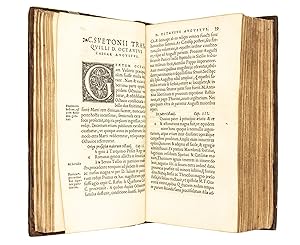About this Item
A tall copy in contemporary French panelled calf with gilt ornaments on the boards and spine (wear to hinges). Early ownership inscription inked over on pastedown; another -partially legible- inscription reads 'Anthonii Eutg.[?]'. Later notes on rear pastedown. Title lightly soiled, occ. marginal dampstains. Coline's iconic "Tempus" device appears on the title-page. Very fine ornamental criblé initials introduce each of the lives. Suetonius' "Lives of the Twelve Caesars" was first printed at Rome in 1470. This is the third Colines edition, edited by Erasmus, whose edition was first printed by Froben in 1516. The "Lives" comprises biographies of Julius Caesar and the first eleven Roman emperors: Augustus, Tiberius, Caligula, Claudius, Nero, Galba, Otho, Vitellius, Vespasian, Titus, and Domitian. Suetonius served under two emperors: Trajan, who put Suetonius in charge of the public libraries, and Hadrian, for whom he worked in the imperial archives and handled the emperor's correspondence. His access to the imperial archives -and his proximity to Hadrian- would serve Suetonius well in his composition of the work for which he is best remembered. "Suetonius' adoption of the biographical genre shows his awareness that this is the form of historical writing best suited to explain the new form that power has assumed (i.e. the individual, personal form of the principate), and also that the biography of individual emperors is best adapted to periodizing the history of the Empire. In the rejection of the annalistic scheme (i.e. the narrative of events year by year), which senatorial culture had tied to the succession of republican magistrates, one perceives the realistic awareness that those magistracies, though still existing formally, are now a mere fiction and that only the duration of each emperor's reign can articulate the succession of periods. "Suetonius has a notable tendency to emphasize the private lives of the emperors, which is often deplored as a low taste for gossip. He is fond of describing their excesses and intemperance and dwelling on petty or scandalous details, a tendency that has enhanced the success of the work, since it was read as a handbook of royal perversions. In this tendency one is also inclined to see the manifestation of a desire for objectivity and demystification and of an intention to provide a comprehensive portrait of the person, illuminating all aspects of both his public and his private life, without falling into encomium and without rejecting the concrete notices the imperial archives made available to him."(Conte) Moreover, the "Lives" provide a window on the customs, institutions, and attitudes of Romans in the first hundred years of the principate. Like the poems of Martial and Juvenal, Suetonius' work is of importance for reconstructing the social fabric of first century Rome. Suetonius achieved lasting success. His influence can be felt in the work of late antique and early medieval Encyclopedists (from Eutropius to Isidore of Seville) and he seems to have become a central author during the Carolingian Renaissance. In the 9th century, Einhard modeled his Life of Charlemagne on Suetonius' Life of Julius Caesar. Suetonius' influence in Renaissance Italy was profound. Petrarch, who owned two of the surviving ten 14th c. manuscripts (and another from the 12th c.) of the "Lives", counted Suetonius as one of his favorite authors and modeled his own "De viris illustribus" on the "Twelve Emperors". Boccaccio also made extensive use of the work. The work's popularity only increased during the Renaissance. The great Italian families (Visconti, Medici, Strozzi, Piccolomini, etc.) all had manuscripts of the "Lives" in their libraries. However, it was not until late in the 15th c. that humanist commentaries began to be published. The second part of this Colines edition contains annotations to Suetonius, and Latin translations of the Greek passages, by Giovanni Battista Cipelli (c.1475-1553), Italian orator. Seller Inventory # 4732
Contact seller
Report this item
![]()




